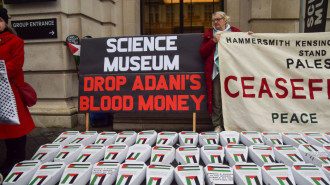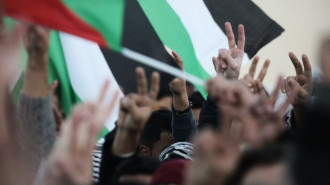
The sky's the limit: Meet Bayan Abusalameh, inventor of the miniature satellite Palestine 1

"I believe that any step could spark the beginning of a journey of scientific research, and from there begins a long road of effort. As for my dream: it's to work with NASA and to see a Palestinian space station established," begins Bayan Abusalameh.
The young Palestinian engineer got online media platforms buzzing with excitement in October after her invention of a new model for miniature satellites, which she had laid out in her master's thesis, submitted at London's Queen Mary University.
The 25-year-old graduate from the mechanical engineering college of Birzeit University in the West Bank has drawn attention across the world, in particular with the name she has given her project: "Palestine 1".
"My passion for space started when I was a child - I used to watch the stars and spin round until it seemed like they were spinning with me. I was always curious about what was hidden in the farthest reaches of the skies"
A lifelong passion for space
Bayan talks about her lifelong fascination with the subject: "My passion for space started when I was a child – I used to watch the stars and spin round until it seemed like they were spinning with me. I was always curious about what was hidden in the farthest reaches of the skies, and I was always talking about becoming an astronaut. This dream carried on in my teenage years and when I went to university, I felt as though I was getting closer, even more so when I worked on my Master’s thesis.
"I chose mechanical engineering and pursued my dreams, despite the prejudices of a society which thinks of this as a man's field. I have definitely had moments of doubt, but I have been able to overcome them and strengthen my resolve to succeed."
After finishing her bachelor degree, Bayan applied for the international Chevening Scholarship which is funded by the British government. It is aimed at students who show leadership qualities from over 160 countries and who wish to pursue postgraduate studies in the UK.
|
|
Bayan was overjoyed when she was offered a scholarship. She believes the extra voluntary work she did while at Birzeit contributed to this: she had met people from many different countries and had travelled to the USA to give lectures, including one at Harvard University.
Studying in the UK
Bayan's master's study in London coincided with several challenges, not least the coronavirus pandemic which stopped her accessing university services like the library and the laboratory. The events in Sheikh Jarrah which her family were going through in Palestine also made it difficult for her to focus.
Psychological pressures were piling up at a time she was supposed to be focusing on her thesis and exams.
"Inside I was suffering, but the support of my family and friends here and in the West Bank helped me and taught me my strength," she says.
"I still remember people who mocked my enthusiasm, trying to make me doubt myself. Their words stayed with me for years, but they didn’t sap my determination – they increased it"
With regards to the young engineer, "negative comments might be the most difficult challenge for all of us. I still remember people who mocked my enthusiasm, trying to make me doubt myself. Their words stayed with me for years, but they didn’t sap my determination – they increased it".
She recalls an incident during her bachelor degree when she told a fellow student about her idea of a Palestinian satellite, and he sarcastically replied: "Do we have a Palestinian space agency? To take you to the moon?" She laughs and says: "In the beginning I wanted to achieve my goals to prove them wrong. But later my perspective changed totally, and my overriding concern was that Palestine should have a place in the space industry."
Today she sees a positive change in the viewpoints of many around her, with many now accepting the idea that a woman can work in mechanical and space engineering, pointing out, "change in any field begins with an idea people find strange, but once it has happened once, they quickly accept it and come to believe in it."
Thank you @PaliRootsTees #FromPalestineToSpace #من_فلسطين_للفضاء https://t.co/fgTZpxhpLw
— Bayan Abusalameh (@BayanAbusalameh) October 14, 2021
On the title of her thesis, Palestine 1, Bayan explains: "The design itself has a Palestinian character – anyone who sees it will know it is Palestinian. This is where the idea of the name came from." She is unable to say more because her lawyer is currently working to register her intellectual property rights.
Regarding possible funding from Arab and foreign interested parties to actually build the satellite, she says: "That would be amazing. But even if no official party is interested, people from across the world have written to me, saying they want to support and donate."
She continues: "Satellite building projects usually need years of study and assurances of success in space to be implemented. I’m hoping that Palestine 1 will be visible in outer space within three years."
"I’m hoping that Palestine 1 will be visible in outer space within three years"
Palestine 1: Aiding Middle East agency in climate proposals
Bayan is expecting the launch of her satellite to meet political pushback. "There are steps which can be taken if that happens, especially since the project aims are academic, and focussed on offering science and research based-solutions to problems we face in the Middle East, among them urban sprawl."
She explains further, that "the way land is distributed in the region, between agricultural and urban areas is posing a threat to regional resources. Also, urban planning should be based on aerial data not ground data.
"At the moment instead of looking at the region holistically each part is being viewed and dealt with separately. Urban sprawl presents a long-term threat and will affect the land after 10 years, for example, and not immediately. Aerial images will enable the relevant parties to plan urban area development with the longer term in mind, and not just for one or two years."
Climate change is another of Bayan's areas of interest. She points out that "global conferences discuss the Middle East and propose solutions for the region with no scientific basis, nor have they used satellite images", hoping that "Palestine 1 will provide scientific foundations for solving climate change-related issues in this region."
She adds: "The world treats climate change as though it's only a geopolitical issue, when it is much deeper than that, and foreign policies shouldn’t be imposed on our region as if they represent the most ideal solution to climate change: instead we should use a scientific basis to looked at what can be done to solve these problems.
"Conferences usually go like this: the UK, for example, decides the Middle East needs some foreign policies or British interference in order to combat the problems of climate change. However, on what grounds has the UK taken this decision? Was it based on a study, or satellite imagery of the region? It makes no sense to come up with solutions in this way."
Bayan is also determined to send a message to female university students, especially in the STEM disciplines..."It is irrational that men should be dominating these industries in 2021"
On studying in Palestine, Bayan says, "Birzeit University makes its students study the Palestinian cause and Palestinian identity. The programme helps students consolidate the deep understanding that the Palestinian cause is a just cause. It also gave me the educational foundations which allowed me to study a master's degree at a British university."
She is also determined to send a message to female university students, especially in the STEM subjects, who face views which try to convince them that women shouldn't be in these fields, to which she states: "You have to silence these voices. It is irrational that men should be dominating these industries in 2021."
This is an edited translation from our Arabic edition. To read the original article click here.
Translated by Rose Chacko



